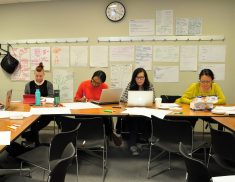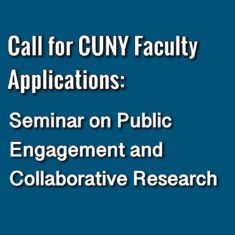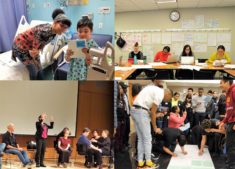About these fellowship opportunities
CALL FOR GC DOCTORAL STUDENT APPLICATIONS: TEACHING FELLOWS, DIGITAL PUBLICS FELLOWS & PROVOST'S FELLOW IN THE PUBLIC HUMANITIES: (Deadline: October 15th, 2019):
Applicants will be notified by December 2nd, 2019.
The information below can also be accessed in this PDF.
The link to the application is at the bottom of this page.
Information Sessions (taking place in Room 8304 at the Graduate Center, CUNY); click to RSVP:
TEACHING FELLOWS
The Center for the Humanities is currently seeking 3 Teaching Fellows (GC Doctoral students) entering their third year or higher by Fall 2020 to bring public humanities practices into their classrooms, as part of Seminar on Public Engagement. Teaching fellows will receive:
Tuition fellowship
Stipend for project development
Funds for student involvement in public humanities events
Support from Faculty Coleaders and Center for the Humanities staff
Teaching Fellows will be liaisons between community college students, seminar participants, community partners, and guest speakers. Working closely with faculty coleaders, they will develop innovative pedagogy and public humanities practices in their curriculum, thereby ensuring that the research being produced through the seminar reaches all publics housed within the CUNY system. They will be provided with space at the Center for the Humanities one day a week to develop and analyze their classroom experiences and be encouraged to collaborate with other public humanities initiatives at the GC.
DIGITAL PUBLICS FELLOWS:
The Center for the Humanities is currently seeking 3 Digital Publics Fellows (GC Doctoral students) entering their second year or higher by Fall 2020 working in digital humanities will receive:
Tuition fellowship
Stipend for digital platform development
Digital Humanities training, including support to attend the Digital Humanities Summer Institute at the University of Victoria, Canada
Digital Publics Fellows will float between the three research teams, connecting them through interpretative digital interfaces. They will work at the Center for the Humanities one day a week to develop technological platforms and digital media tools around the initiative and be encouraged to collaborate with other public and digital humanities initiatives at the GC.
THE PROVOST'S FELLOW IN THE PUBLIC HUMANITIES:
The Center for the Humanities is currently seeking 1 Provost’s Fellow in the Public Humanities (GC Doctoral student) who will work with the entire cohort as well as departments across the building to make connections and conduct research and analysis about ongoing public humanities practices at the GC. This fellow will receive:
- Tuition Fellowship
- A working space at the GC to undertake research
The Provost’s Fellow in the Public Humanities will work closely with the seminar cohort, the Public Humanities Task Force, the Center for the Humanities, and PublicsLab to conduct research and service in the public humanities. The Provost’s Fellow will conduct and analyze research on ongoing public humanities work at CUNY for two years. During the first year, the fellow will focus on creating networks for communication between centers, institutes, and departments championing public humanities work at the GC. During the second year, the fellow expands the scope of the established network to facilitate communication across all 24 CUNY campuses. By synthesizing their research, and unifying and amplifying these networks, this fellow will gain valuable insight into the ways in which public humanities efforts transform centers of higher education and the communities they serve while also ensuring greater cohesion and collaboration across the largest and most diverse public urban university in the country.
COMPENSATION/SUPPORT
These highly competitive fellowships offer a graduate assistantship, administered by the Center per year to promote engagement in public humanities-related projects as part of the seminar. Teaching and Digital Publics Fellows will also receive a stipend of $2500 minimum to enact public humanities activities in digital and classroom spaces. More funds may be made available through a budget request during the grant cycle. The graduate assistant appointment will provide in-state tuition remission to students within their first 10 registered semesters of doctoral study at the CUNY Graduate Center. Each fellowship is for one year with an option to renew for a second; it will require a 15 hour per week commitment. The Center for the Humanities will provide logistical support for collaborative activities, projects and programming.
ABOUT
What is the Seminar on Public Engagement and Collaborative Research?
The Seminar on Public Engagement and Collaborative Research is a two-year public humanities initiative generously funded by the Andrew W. Mellon Foundation. The seminar, which will run from 2020 - 2022, builds on The Center for the Humanities’ successful past two iterations of the initiative to promote the diverse ways the humanities function in public life as a public good. Bringing together a network of at least 38 faculty, students, adjuncts and art professionals, and–uniquely–civic, cultural, and community partners, the seminar produces and circulates research through public projects, engaged scholarship, and interdisciplinary activities at the City University of New York and in New York City itself. Click to read about the guiding questions and values of the seminar.
For more information about projects produced by past Seminar participants, click here.
PROPOSED RESEARCH THEMES
In order to activate a range of academic disciplines, the seminar is organized into three distinct research teams. The overall seminar and its integrated research teams provide a tiered, networked structure to promote both broad inquiry into public research methodologies as well as focused scholarship on specific critical topics that bridge the arts and humanities, the digital humanities, the humanities-related social sciences, and social justice. Each research team (of 8-10 participants) is led by 2 Faculty Coleaders.
The Seminar will support various forms of intellectual and cultural production exploring research related to three open-ended themes. These themes are meant to serve as springboards rather than prescriptions: themes, methods, and outcomes will ultimately be designed collaboratively by participants:
- Blue Humanities: What implications does “the oceanic turn” in modernity have on colonial, imperial, and environmental humanistic scholarship? How does the social construction of the global ocean shape life on land and notions of the nation state? This research team could explore the ways in which any number of waterborne issues transform how societies perceive, construct, and manage coastal ecologies and economies. As an archipelago, New York City is fertile territory for public scholars to inquire into and act in concert with numerous communities engaged in waterfront advocacy along its historic rivers, parks, shores, and ports.
- The Humanities and Public Discourse: How can humanistic research and activities enrich public discourse on topics including education, democratic practice, and civic inclusivity? In an increasingly polarized culture, might public humanities practices and community engagement create opportunities to better understand, and thus mitigate, the personal, social, historical, and cultural conditions that prevent open, democratic conversation across difference? This group will research, analyze, and deploy strategies for transforming conflict into constructive public debate.
- Urban Neighborhoods: What role does humanistic research play in bettering urban life at the neighborhood level? How can the public humanities help preserve the uniqueness of diverse and integrated cultural and ethnic enclaves in cities increasingly homogenized by rising rent, local development, and the global real estate market? We envision this theme bringing together a diverse cohort of humanists and social scientists to activate topics ranging from immigration and sanctuary to equitable food distribution; from community control of public and green spaces to community archives and oral histories; from gentrification and displacement to public art and the production of culture; from local governance and participatory budgeting to racial, religious, and linguistic inclusivity.
What is a public humanities project?
Some examples of public projects collaboratively produced through the seminar include: archival research, intervention, and presentation; artworks; exhibitions; films; choreographic works and performances; classroom initiatives; translations; co-authored articles; public syllabi; workshops and classes; interpretive websites and interactive digital platforms; theatrical productions; books and publications; and community actions. Public projects are seated in serious scholarly research and connect communities working both inside and outside the university setting through engaged activities. For more information, view here.
ELIGIBILITY & REQUIREMENTS FOR ALL FELLOWS
- Doctoral student in the humanities or humanities-related social sciences at the Graduate Center, CUNY making satisfactory progress towards their degree are eligible to apply. (Please note that previous participants are ineligible).
- Interest in public humanities methodologies and teaching practices.
Additional Requirements for Teaching Fellows:
- Entering at least 3rd year in fall 2020;
- Teaching experience in the senior or community colleges;
- Must teach one class per semester at a senior or community college for duration of grant.
Additional Requirements for Digital Publics Fellows:
- Entering 2nd year of study or higher in fall 2020;
- Web development, interactive and interpretative design, and social media experience.
All Fellows Will
- Attend seminar meetings and occasional professional development workshops at the GC;
- Work one day a week at the Center for the Humanities
- Attend monthly fellows meetings
- Contribute to the Center for the Humanities blog (one blog entry per semester);
- Build and evaluate curriculum informed by public projects underway;
- Work independently on self-directed research and projects while contributing to other related initiatives by cohort members;
- Participate in, help plan, and promote public events generated by the seminar.
SEMINAR STRUCTURE
SPRING 2020: GC student fellows will meet monthly in spring 2020 to build plans, set goals, establish community partnerships, and share strategies for student and public engagement with senior advisors, doctoral students, and Center staff. This R&D period will help feed into the production of ongoing public projects.
FALL 2020–SPRING 2022): GC student fellows will head one of three research groups working under the rubric of the seminar to plan and promote public humanities activities in collaboration with community partners. These activities will take place throughout the duration of the grant.
SPRING 2021–SPRING 2022: Public activities culminate. GC student fellows will have an opportunity to work alongside Faculty Coleaders in reflection, analysis, and documentation of ongoing projects, resulting in digital, new media, and print interfaces that model and analyze public scholarship for a wide readership.
APPLICATION
Please download and fill out the PDF below as your application. The PDF should be saved as Last Name_First Name_Fellowship (Teaching/Digital/Provosts) and emailed, along with your CV to [email protected].
*We highly suggest taking a look at the application now. However, we will be releasing informational videos and offering past project examples throughout the summer, so we encourage you to take your time with this application. There will be several informational sessions at the Graduate Center in early September.
Click here or below to download the PDF Application Form.
Applications will be judged by a selections committee on: Scholarship; Creativity, Feasibility, Necessity, and Engagement.
DEADLINE
Applications are due October 15th, 2019.
December 2nd: GC student fellowship notifications sent out to applicants.
Information Session Video


